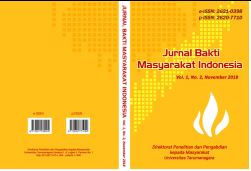PSIKOEDUKASI STRATEGI MENGELOLA KELAS BAGI GURU DI SEKOLAH DASAR
Main Article Content
Abstract
Teachers need information to understand the characteristics of students, especially in the meanings of individual differences. Community service is intended to answer the problems perceived by the teacher. Based on the information obtained, then formulated the core problems experienced by teachers in the form of the need for knowledge and understanding the characteristics of students of public primary schools in Jakarta. Teachers need information about classroom managing techniques. The aimed of this activity was to improve the knowledge and understanding of teachers through psychoeducation with providing life skills intervention. The subjects or participants in this activity are teachers. A pre-test was first conducted that measured teachers' perceptions of how to manage the class by using Teacher's Sense of Efficacy Scale (TSES) questionnaire. After that, the resource person provides material on classroom management. Data analysis was using SPSS 18 version for windows. The paired sample T-test technique was used to see the effectiveness of the psychoeducation. There was no difference between a score of the pre-test (M = 4.0190, SD = 0.51470) and a score on the post-test (M = 4.1238, SD = 0.52867); Z = -0.788, and p = 0.431> 0.05. However, in the reflection of the activities of each participant expressed the usefulness of this event. Based on the activities that have been done, it can be concluded that the teachers who have provided feedback through self-report evaluation results, states that the students get the benefits of these activities.
Article Details
This work is licensed under a Jurnal Bakti Masyarakat Indonesia https://creativecommons.org/licenses/by-nc-sa/4.0/
References
Akin-Little, A., Little, S.G., Bray, M.A., & Kehle, T.J. (2009). Behavioral intervention
in school: Evidence-based positive strategies. Washington, DC: American
Psychological Association.
Dicke, T., Parker, P. D., Marsch, H. W., Kunter, M., Schmek, A., & Leutner, D. (2014). Self-efficacy in classroom management, classroom disturbance, and emotional exhaustion: A moderated mediation analysis of teacher candidates. Journal of Educational Psychology, 106(12), 569-583. Retrieved from http://dx.doi.org/10.1037/a0035504
Fives, H. & Buehl, M. M. (2010). Examining the factor structure of the
teachers’ sense of efficacy scale. The Journal of Experimental Education, 78, 118–134. doi: 10.1080/00220970903224461
Lukens, E. P. McFarlane, W. R. (2004). Psychoeducation as evidence-based practice: Consideration for practice, research, and policy. Journal Brief Treatment and Crisis Intervention, 4. Oxford University Press.
Santrock, J. W. (2011). Educational psychology (5th ed.). New York, NY: McGraw Hill.
Zuriyani. E. (2015). Kementrian agama: Peranan guru dalam pengelolaan kelas efektif.
Diunduh dari https://www.youtube.com/watch?v=T62hcSw6LCg
Five, H., & Buehl, M.M. (2010). Examining the factor structure of the teachers’ sense of
efficacy scale. The Journal of Experimental Education, 78, 118–134. doi: 10.1080/00220970903224461


